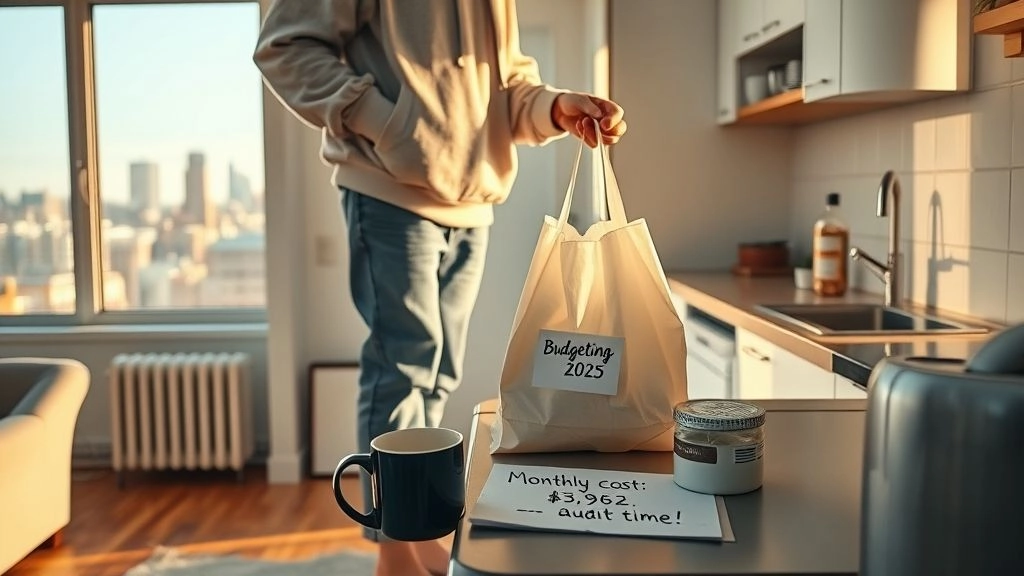The Real Bill Hits Hard
Let’s just say, if I had a dollar for every time someone told me “living alone gets expensive,” I’d probably have enough to cover my WiFi for at least three months. But here’s the thing: most of us don’t really know how much it costs to live on your own per month until we’re knee-deep in utility bills, groceries, and “surprise” fees (looking at you, toilet paper and cleaning spray!).
Honestly, that first month after I moved out? My bank account looked like it had seen a ghost—my “estimate” was off by almost $500. Why? Because all those little things you didn’t budget for are what eat up your funds… drip by drip. Let’s walk through what it really costs, how people save, and how you can keep your money from quietly sneaking off while you’re not looking.
Where Does Your Money Even Go?
Let’s break it down. You probably think of rent first, right? Sure, that’s a biggie, but it’s not the only drain. Check what happened to me that first winter—my heating bill skyrocketed because apparently, I love feeling like a cozy burrito, and I never once thought about energy costs.
Rent: The Elephant in Your Room
Okay, so on average, renting a one-bedroom in the U.S. floats somewhere between $1,600 and $1,800 a month according to data on apartment rental costs in 2025. If you’re in a big city, it’s way more—think $2,500+ for a studio in New York, or maybe $800–$1,100 if you’re in the Midwest. Wanted a fancy couch to go with it? That’s extra, and furnished places charge a premium, like 10–25% more.
Still with me? This isn’t to scare you—it’s just the reality check I wish someone had given me. Don’t forget all the sneaky extras like renters’ insurance or when your landlord hikes the rent “because inflation.” If you’re scrappy, you can save a huge bundle—here are some what are some ways that someone can save money on their rent?. My roommate once bartered yard work for $100 off rent. No joke.
Table: Rent Snapshots in Different US Cities
| City | Studio (Avg/Month) | 1 Bedroom (Avg/Month) | 3 Bedroom (Avg/Month) |
|---|---|---|---|
| New York | $3,550 | $3,500 | $5,400 |
| Seattle | $1,800 | $2,500 | $3,400 |
| Ohio (Akron/Cleveland) | $900 | $1,100 | $1,800 |
| Texas (Austin) | $1,100 | $1,300 | $2,000 |
Utilities and Fees: Ouch, That Adds Up
Utilities normally add $150–$300 per month, depending on usage and where you live. That’s things like electricity, water, gas, trash, and WiFi (my lifeline). One winter, I left my lights on all day because I “liked the vibe,” and my power bill doubled. Never again.
But here’s a plot twist: you can actually shave up to $500 a year off your utilities with a few small changes. Unplug stuff you aren’t using, switch to LED bulbs, and line-dry your clothes sometimes. I thought air-drying was just for grandmas… until my bill dropped. Check out these energy-saving frugal living moves—there’s stuff in here that’s as good for your wallet as it is for the planet.
Wait: More Than Just Rent?
Let’s get real—you have to eat, get around, have some fun, right? Here’s what most folks spend. Let’s call it our Monthly expenses list sample.
Table: What Does the Average Month Look Like?
| Expense Category | National Average (2025) | Can You Go Lower? |
|---|---|---|
| Rent/Housing | $1,684 | Try house-hacking or roommate |
| Utilities | $180 | Lighten up, literally |
| Food/Groceries | $572 | Meal prep = savings |
| Transport | $756 | Bike/bus or split rides |
| Insurance & Health | $400 | Shop plans |
| Entertainment | $120 | Swap Netflix? |
| Sneaky Extras | $250 | DIY, bulk shop |
| Total | $3,962 |
(Data inspired by research on spending habits and BLS stats. Your mileage may vary—and that’s okay!)
Groceries: DIY or Bust
Groceries eat up more than you’d think—national average is around $572 per month but it swings. That “I’ll just pop in for milk” trip? Turns into $50 every time. Want to win at this? Bulk buy, meal-prep on Sundays, and avoid pre-cut anything. I’ve learned it’s $3 cheaper to chop my veggie medley, and meal planning keeps me from tossing sad lettuce out every Friday.
My friend Jamie and I even started sharing bulk hauls. “You get the onions, I’ll get the cheese”—it’s weirdly bonding and saves us both big time.
Transportation: It’s Not Just Gas
Think it’s just gas? Nah. It’s car payments, insurance, parking, maintenance, Ubers when you “just can’t.” National average? $756 per month for a car owner. I ditched my car a year ago, swapped for a bus pass—bam, $200 back in my pocket monthly. Even if a car feels “easier,” just sitting in your driveway, it’s quietly costing you. Try the back-of-envelope math using the How much does it cost to live on your own calculator.
What About the “extras”?
Entertainment, personal care, and the little things. One month, I realized I’d paid for five streaming services because I forgot to cancel free trials—and my Starbucks app was its own line item. Add in gifts, subscription boxes, and those “early payday” groceries—that’s $200+ that most people don’t budget for, but… surprise! They always show up.
Frugal win: My cousin holds a “no-spend weekend” every month. She swears by it. Forces you to enjoy stuff you already pay for—parks, old puzzles, homemade pizza. (I tried… didn’t last the whole weekend, but I saved about $60.)
Location Is Everything (Well, Almost)
Here’s the kicker: Where you live has a massive impact on how much does it cost to live on your own per month. Cities on the coasts eat paychecks for breakfast; smaller towns or suburbs? Not as vicious. I had a friend move from LA to Tulsa and instantly cut her expenses by 30%—no dramatic lifestyle shift, just cheaper rent and lower taxes.
Check state-by-state (some need $80k/yr just to live “okay”; others, much less). Curious? Look it up on this analysis of what salary you need by state.
Rent or Buy? (And… Generosity?!)
Okay, let’s get real—should you rent, or buy? Renting seems to cost more month-to-month, but it’s flexible. No killer closing costs, and if your job changes, you aren’t “stuck.” Throw in roomies, and it drops a ton. That means you might spend more on lattes and less on repairs… and sometimes have more space in your budget for stuff that feels good, like donating or treating friends. Yeah, really—learn how experts explain how renting or buying a home is connected with someone’s ability to be generous?.
My aunt, for example, downsized to a small apartment and ended up joining two “giving circles”—she said she’d never have done it back when she was drowning in property taxes.
Hacks to Keep More Money (and Sanity!)
You don’t have to be a spreadsheet wizard… just pay attention. Here are top frugal tips I wish I knew sooner (and that actually work, without sucking all the fun from life):
- Use that How much does it cost to live on your own calculator… and be honest about your coffee habit.
- Auto-transfer $50 a week into emergency savings. You won’t miss it—until the dryer dies or your tooth hurts…
- Meal plan around sales. Buy meat/veg on discount and freeze. No judgment if you forget it four months later; you’ll get there.
- Split a Costco/Sam’s Club membership with a friend. Exchange “treats” each month—less waste, more fun.
- Audit your subscriptions quarterly. Do you really need five streaming services and three gym passes?
- Embrace “house-hacking”—sublet the second bedroom, rent your parking spot, or do pet-sitting for credit. This one pays my internet bill every month.
- Explore what are some ways that someone can save money on their rent? such as negotiating leases, checking move-in deals, or even bartering skills like yard work.
Story Time: The $70,000 Roommate, and More
Seriously—there was this Reddit thread about a guy who lived with family until age 29, pile-driving $70k into savings. Eventually, he bought a condo outright when prices dropped. Now? Mortgage-free for life. Not all of us have family support or patience for one-bathroom chaos (I moved out mostly to avoid family drama…), but the principle holds: however you hack it, the longer you can minimize the “big costs,” the more you win in the long run. Check forums, swap stories, and find what works in your city.
The Bottom Line—It’s All About Choices
So… how much does it cost to live on your own per month? It’s not one magic number. It’s about $3,500–$4,700 for most folks in the U.S. ($1,600–$1,800 rent, $500–$700 groceries/food, $180–$300 utilities, and everything else sprinkled in). If you love big cities, be ready for a steeper climb. The trick is dodging those sneaky, invisible spenders—the Amazon deals, the $5 lattes, the “just-because” Target runs—and putting your money toward the stuff that really matters to you.
Renting versus buying, solo or shared, city or suburb: there’s no one “right” move. Just the one that leaves your bank account breathing easy at night. Use tools like the How much does it cost to live on your own calculator, and compare your numbers honestly. Don’t just guess—run the math, swap out what doesn’t work, and see how much you can free up for travel, giving, or hobbies you love.
And don’t forget—every so often, go read up on explain how renting or buying a home is connected with someone’s ability to be generous?. Sometimes, the best frugal choices give you way more than just spare cash—they open up time, mental space, and chances to do good.
You Got This—Make Your Move
Look, living on your own is exciting—it’s your freedom, your space, and your rules. But man, it’s easy to underestimate the true cost of all that independence. Start by getting real with your numbers, plug them into a calculator, swap war stories with friends, and don’t beat yourself up when you discover a forgotten bill under a stack of mail. That’s life. Tweak, repeat, save a little here and there, and watch how it all adds up—maybe even faster than you thought.
Your turn… what “hidden cost” surprised you the most when you struck out solo? Drop a comment with your biggest save or your silliest “why did I buy that?” moment. And if you’ve got a roommate horror story (or a roommate hack), lay it on me—I’m always looking for new ways to keep the bills at bay. Here’s to smarter spending, more saving, and the best kind of messy, independent living!













